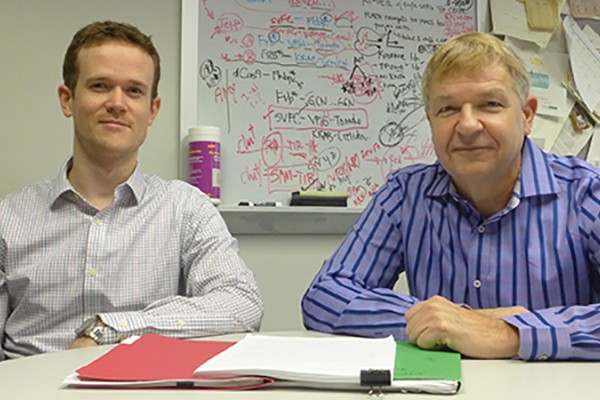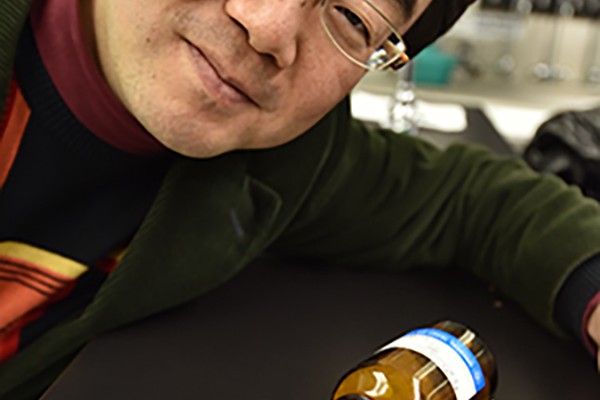Light — not pain-killing drugs — used to activate brain’s opioid receptors
Washington University School of Medicine neuroscientists, led by Michael R. Bruchas, PhD, assistant professor of anesthesiology and of neurobiology, have attached the light-sensing protein rhodopsin to opioid receptor parts to activate the receptor pathways using light from a laser fiber-optic device. They also influenced the behavior of mice using light, rather than drugs, to activate the reward response.
Innovative family planning clinic recruiting study participants
Washington University School of Medicine and the Brown School have received a $4 million grant to study whether a new model of providing family planning services can reduce unintended pregnancies and births. As part of the study, they are recruiting 10,000 women of child-bearing age in the St. Louis area to participate.
Discovery may open door for treating fragile X carriers
Fragile X syndrome, an inherited cause of autism and intellectual disability, can have consequences even
for carriers of the disorder who don’t have full-blown symptoms. Researchers at Washington University School of Medicine in St. Louis have identified
a potential target for treatment for fragile X carriers.
Major pathway identified in nerve cell death offers hope for therapies
New research highlights how nerves – whether harmed by disease or traumatic injury – start to die, a discovery that unveils novel targets for developing drugs to slow or halt devastating neurodegenerative disorders such as Alzheimer’s disease, Parkinson’s disease and amyolateral sclerosis as well as peripheral nerve damage.
Extra sleep fixes memory problems in flies with Alzheimer’s-like condition
Many studies have linked more sleep to better memory,
but new research in fruit flies at Washington University School of
Medicine in St. Louis demonstrates that extra sleep helps the brain
overcome catastrophic neurological defects that otherwise would block
memory formation.
Fat signals control energy levels in the brain
An enzyme secreted by the body’s fat tissue controls energy levels in the brain, according to new research led by Shin-ichiro Imai, MD, PhD, of the School of Medicine. The findings, in mice, underscore a role for the body’s fat tissue in controlling the brain’s response to food scarcity, and suggest there is an optimal amount of body fat for maximizing health and longevity.
Alzheimer’s research, need for funding highlighted during Blunt visit
U.S. Sen. Roy Blunt, R-Mo., visited the Medical Campus this week to meet with physicians who treat patients with Alzheimer’s disease, and patients and caregivers who live with the debilitating disease every day. Blunt, pictured with physician-scientist Randall J. Bateman, chairs a subcommittee that oversees funding for medical research.
Lewis Wall helps tackle problem of Ethiopian girls lacking sanitary pads
While in Ethiopia as a Fulbright scholar, L. Lewis Wall, MD, DPhil, met a woman who is trying to change the experience of adolescent girls in rural Ethiopia by providing them with reusable sanitary pads and education about menstruation. Wall and his wife, Helen, decided they had to do something to support the mission.
Finding points to a cause of chronic lung disease
Scientists have long suspected that respiratory viruses play a critical role in the development of chronic lung diseases such as asthma and chronic obstructive pulmonary disease (COPD). Studying mouse and cell models of this process, researchers now have shown how immune cells dispatched to the lung to destroy a respiratory virus can fail to disperse after their job is done, setting off a chain of inflammatory events that leads to long-term lung problems.
Bacterial flora of remote tribespeople carries antibiotic resistance genes
Scientists, including researchers from Washington University School of Medicine, have found antibiotic resistance genes in the bacterial flora of a South American tribe that never before had been exposed to antibiotic drugs. The findings suggest that bacteria in the human body have had the ability to resist antibiotics since long before such drugs were ever used to treat disease.
Older Stories





